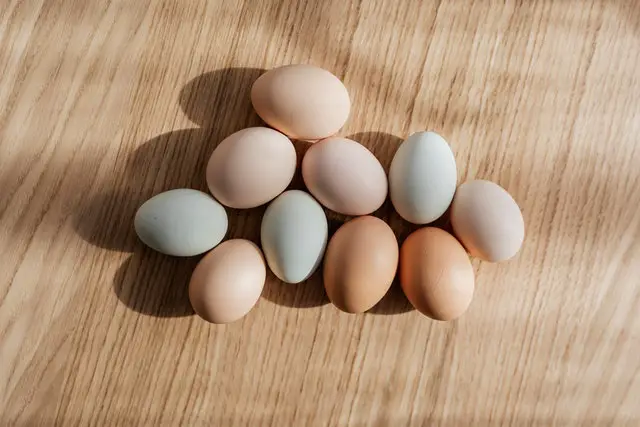Put your hands up in the air if you’ve heard about the peculiar street food “balut”?
Yes, that outlandish variety of dish from the Asian community is primarily made using duck eggs, particularly from the sub-family called Pateros. But why them? Is it because they produce super tender embryo bones to bite on?
Anyways, balut egg is one extreme case of how duck eggs are consumed in certain parts of the world, in the same regions that consume this particular dish, duck eggs are a staple food when boiled, fried, scrambled or even made into omelet to accompany baked beans.
Duck eggs are perfectly safe to consume, balaut style or otherwise, and many people describe their taste as a more advanced form of chicken egg flavor. Duck eggs are highly nutritious and can be made exactly the way chicken eggs are made, meaning they can be fried, scrambled, baked, used in dishes, and even poached in cases to serve with toasted bread.
Because the average duck egg is larger than the average sized chicken egg — we’re making continuous reference to chicken eggs because they’re the most common form of “egg product” you’ll find everywhere, substituting the former for the latter must be done with great care especially for recipes that aren’t so forgiving like cake baking.
In the next few paragraphs, we’ll discuss everything you need to know about eating duck eggs: from their nutrition, taste, appearance, to their availability and various techniques used in preparing them.
At the end, we’ll touch briefly on the topic “are duck egg shells edible” and we’ll see what the scientific consensus is, regarding that.
I know you’re excited already, so let’s get started.
Duck eggs taste more eggy than chicken eggs
When it comes to taste, many nutritionists and home cooks compare the taste of duck eggs with that of chicken eggs, but claim it’s more eggy. Meaning duck eggs taste more chicken-egg-like than chicken eggs themselves.
Their intense flavors are often ascribed to their richer yolks and whites which are, in part, influenced by the breed of duck in question as well as the nature of diet it subsisted on.
Another group of people (like me) can’t help but pick up the swampy and wild flavors when eating duck eggs. I guess it’s an opinion game!
Taste aside, however, duck eggs are damn pretty to look at, even the whites in the shells are clearer and the yolks are deeper in color compared to that of chicken eggs! I promise when you pick them up as substitutes for your chicken eggs, you’ll definitely not regret the decision.
Duck eggs are pretty too
Have you seen the fanciful colors that duck eggs come in? If no one said they’re real, you’d think it’s another marketing tactic pulled off along the production chain!
But it’s not! Duck eggs come in a variety of colors that are beautiful, just like chicken eggs too — not the ones injected into the markets though.
Depending on the breed, ducks can lay eggs in colors such as light green, various shades of grey and close to black, brown, speckled, blue green, pale blue, and also white.
It’s important to understand though, that the colors in no way affect the flavor of the egg. White eggs will taste exactly like the grey or speckled eggs, except for ducks that subsisted on pretty different diets.
Duck eggs are nutritious, more so than chicken eggs.
Like any other egg, duck eggs are made up of whites and yolks which are very nutritious according to much scientific evidence.
Duck eggs are naturally bigger than chicken eggs, and because of that, along with some other reasons, they contain higher levels of some nutrients compared to chicken eggs, although in some departments too chicken eggs have the upper hand.
Take for example, Vitamin B12, which is a nutrient attractive for its possible role in the formation of red blood cells as well as the proper functioning of the nerve.
In a 100 g serving of cooked duck egg, you get around 168% of the recommended Daily Value intake, whereas the equivalent in the same serving of chicken egg is 32%. The same is seen with nutrients like folate, thiamine, iron and the Vitamins A, B6 and E.
On the other hand, choline, which is a nutrient expected to aid in the development of brain health in newborns, is slightly more in 100g serving of cooked chicken egg than it is in cooked duck egg.
Some of the proteins in egg whites like lysozyme and conalbumin are also more abundant in chicken eggs than in duck eggs!
It’s good to understand that the comparison is done on the basis of equal weight (i.e. carefully selected one and half duck eggs and two chicken eggs which translates to exactly 100g or 3.5 ounce serving).
Chicken eggs aren’t the same sizes as duck eggs. The average sized duck egg is nearly half times bigger than the average sized chicken egg.
So comparing them in that light — which reflects how a majority of us will end up consuming duck eggs, will definitely give duck eggs the upper hand in most, if not all, respects!
Coming to the nutrients contained in duck eggs, some of them include:
- Vitamin B12
- Vitamin E
- Vitamin A
- Protein
- Cholesterol
- Selenium
- Choline
- Folate
- Iron
- Riboflavin
- Carotenoids, which is an antioxidant compound
Through research, we have come to know the tremendous health benefits of some of these nutrients.
The protein in eggs, for example, has been linked with weight loss through better appetite control and feeling of fullness.
Carotenoids found in the egg yolk are linked to a lesser risk of heart disease and some types of cancer.
Choline promotes better brain health as well as assists brain development in newborns. It is also essential for a healthy cell membrane.
And lastly, the vitamin B12 has been linked to a healthy nerve functioning, red blood cell formation and even DNA synthesis.
The risks
Discussed above are the nutrients and the potential benefits you get from consuming duck eggs. What about the risks involved?
The first entry on any food safety guide will most likely be “cholesterol”.
There’s still no consensus regarding the stance on cholesterol, whether they’re bad components of duck eggs or good. Or whether they make duck eggs in general healthy or unhealthy.
This is mostly because of the conflicting studies published out there.
Some emphasize on the dangers it could pose to the health of the hearth, giving it a bad rap, while others demonstrate its neutrality with regards to causing chronic diseases in healthy people.
And others point to the stroke preventing benefits of eating eggs in general!
So because there really isn’t a clear cut agreement regarding cholesterol, it’s best to fall back to the most safest course of action.
And that is to moderate the overall intake of duck eggs.
There’s a saying:
Too much of everything is bad.
So always ensure to consume duck eggs in moderation, especially when you’re diabetic or have a family history of heart disease.
That way, you’re not taking too much cholesterols that could eventually be the cause for concern.
Additionally, taking duck eggs in moderation will ensure you’re not consuming too much heavy metals that may be present in the eggs which can harm your health in the long run.
There’s versatility in what you can do with duck eggs
Duck eggs can be prepared exactly the way chicken eggs are prepared.
You can use them to make scrambled eggs, fried eggs, omelete etc.
Because of the richer yolk, scrambled eggs and eggs prepared using other techniques like frying or omelete appear more creamier.
Feel free to substitute duck eggs in your favorite fried egg recipe, but bear in mind that you may need to adjust the seasoning and cooking time a little bit, especially for bulk cooking.
Also, duck eggs are hard shelled compared to chicken eggs, so you may need to use extra force to break them on the surface of the table.
Poach and boil them
You can also boil duck eggs into various yolk consistency like you would the chicken eggs. Feel free to make soft, medium and hard boiled eggs with them, although people that are compromised are expected to fully cook eggs to at least 160 °F before consuming them to destroy Salmonella and other illness-causing bacteria.
Bake with them
When baking with duck eggs, especially as a substitute for chicken eggs, make sure you ratio or scale down to avoid using too many eggs that can disrupt the integrity of the cooked food.
Some recipes are straightforward and are forgiving, others will punish your mistake with a failed product.
You might discover that baked products come out more vibrant in color, or taste generally richer when you use duck eggs.
Salted duck egg
Salted duck egg is an invention of the Asian world. It involves dipping duck eggs in a brine for upto 3 weeks where they develop a briny aroma, gelatin-like white and firm yolk that is bright orange in color.
How about their availability?
Duck eggs aren’t readily available like chicken eggs. For better luck, you can try your local farmers market when your higher-end grocery stores don’t have them in stock.
Just know that they’ll cost more than chicken eggs. The price for a dozen duck eggs typically range between $6 to $12.
Can You Eat Duck Egg shells?
Absolutely, duck egg shells are edible when ground to powder and used in recipes as calcium boost. Be sure to wash them thoroughly and cook first to destroy any bacteria lingering on the surface that can make you sick.
Final Thoughts
Duck eggs are safe to eat and they taste pretty much like chicken eggs. They are highly nutritious and supply many essential vitamins and minerals to the body.
Duck eggs can be prepared exactly the way chicken eggs are prepared, which means they can be poached, boiled, fried and even made into omelete.
When baking with duck eggs however, especially as a substitute for chicken eggs, ensure to ratio or scale down to avoid baking a mess — egg is that sensitive baking ingredient you don’t want to mess with.

